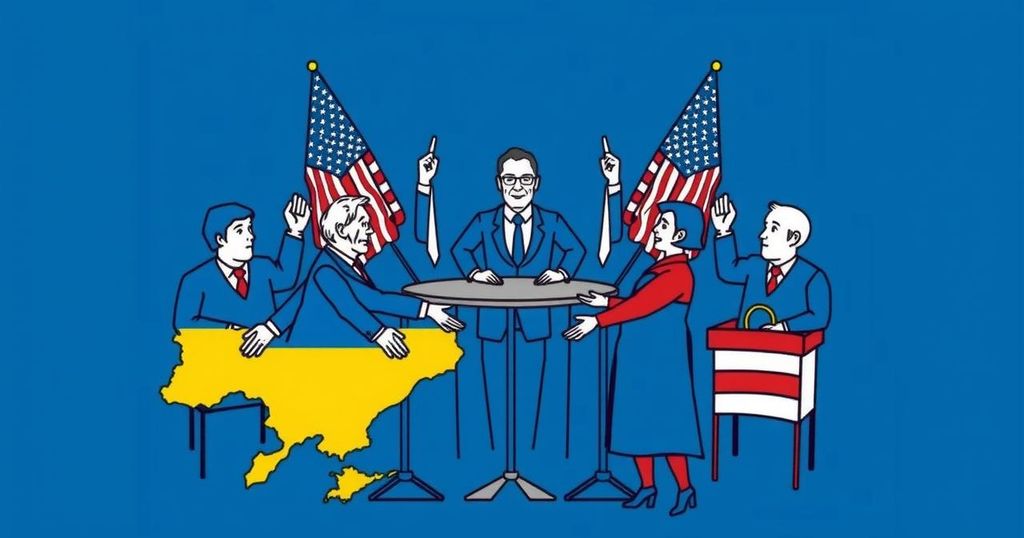NATO Prepares for Potential Changes in U.S. Support for Ukraine Amid Election

The impending U.S. presidential election complicates NATO discussions on support for Ukraine, as U.S. officials fear aid could diminish under a Trump administration. With adversaries like Iran and North Korea boosting military support for Russia, NATO is urging European allies to increase their contributions to ensure Ukraine’s defense. Amidst these tensions, increasing production capabilities and consolidating military assistance strategies are prioritized to maintain support for Ukraine as hostilities continue.
The upcoming U.S. presidential election has cast a shadow over recent NATO discussions, particularly regarding support for Ukraine. Officials fear that if Donald Trump were to return to the presidency, U.S. aid to Ukraine may decrease significantly, while adversarial nations such as Iran, North Korea, and China are reportedly increasing military assistance to Russia. During a closed meeting with NATO defense heads, U.S. Secretary of Defense Lloyd Austin acknowledged the uncertainty surrounding future U.S. support but noted the persistent bipartisan backing for Ukraine among lawmakers. With concerns that the United States may assume a reduced role in Ukraine’s defense, NATO leaders expressed the need for European nations to enhance their contributions, establishing a collective security effort rather than relying on a single ally. A senior NATO official highlighted the grim situation in Ukraine, noting that Russia continues to achieve tactical successes despite Ukraine’s resistance, which is compounded by a disparity in the artillery fire rate. The Biden administration is currently leveraging all available funds to bolster Ukraine’s military capabilities. Measures have been taken to invest in Ukraine’s defense industry, allowing it to produce its own munitions more effectively. In addressing the critical situation regarding military support, it was indicated that NATO is in the process of enhancing its operational framework for training Ukrainian forces and managing assistance to mitigate a potential decline in U.S. support. Furthermore, the NATO alliance is under pressure to increase weapon production to match the scale of the Russian military’s output, which stands at approximately three million munitions per year. In contrast, NATO’s collective production is around two million, leaving a significant gap in meeting Ukraine’s defense needs. The support from North Korea and Iran for Russia further complicates the dynamics of military aid, raising concerns about NATO’s ability to sustain long-term support against the ongoing threats. The overarching message from NATO leadership remains one of unity concerning support for Ukraine, emphasizing that aiding Ukraine is not merely an act of charity but a strategic investment in collective security.
The topic of U.S. support for Ukraine amidst geopolitical tensions has gained significant prominence in light of the upcoming U.S. presidential election. The possibility of a Donald Trump victory raises uncertainties regarding the sustainability of U.S. military assistance to Ukraine, especially given Trump’s past statements regarding the Ukrainian conflict. NATO, facing increasing military support from adversarial nations to Russia, is preparing for a scenario where American contributions might wane, thereby compelling European allies to amplify their involvement in Ukraine’s defense. This change necessitates a recalibration of NATO’s operational strategies and underscores the urgency of securing military aid for Ukraine in the face of ongoing hostilities.
In summary, the impending U.S. presidential election poses a potential risk to the continuity of military support for Ukraine, particularly if Donald Trump re-assumes the presidency. NATO officials are affirming the need for Europe to elevate its defense commitments in light of this uncertainty, while also expressing concerns over ongoing military aid from adversarial states to Russia. The alliance is striving for a unified approach to assist Ukraine, recognizing that sustained support is crucial not only for Ukraine’s survival but also for the collective security interests of NATO members.
Original Source: www.cnn.com








